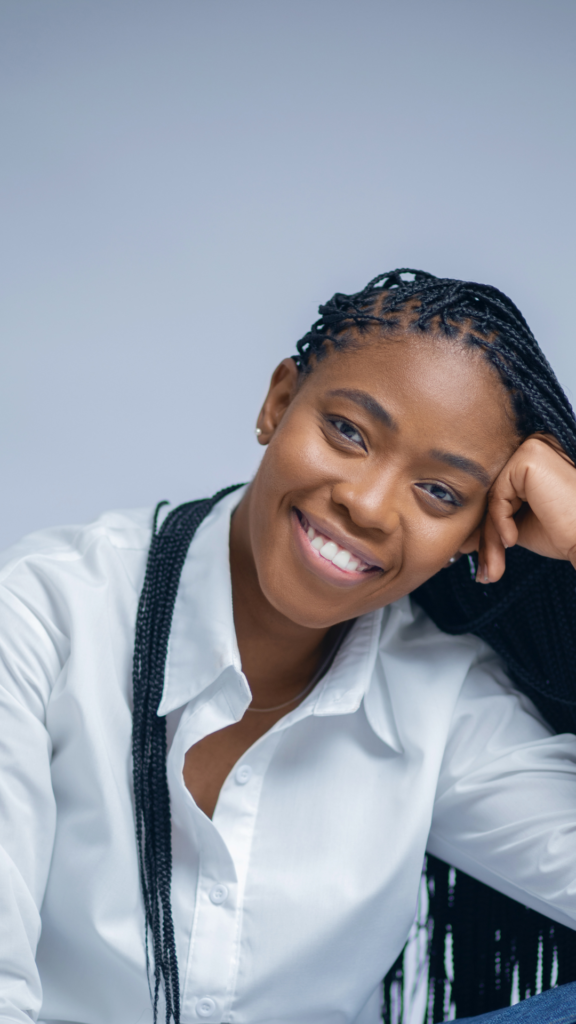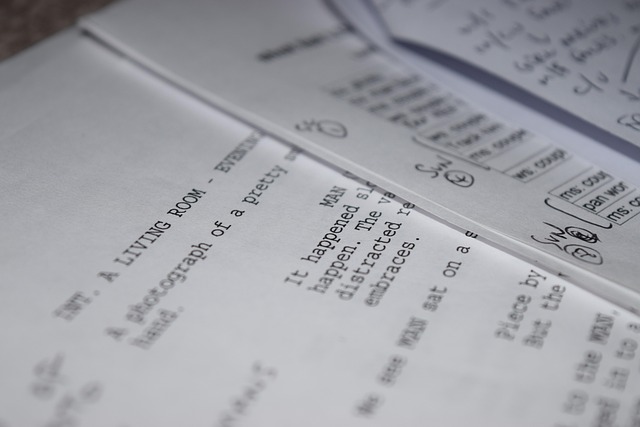This week we hear from Tomi Adesina, a PhD candidate in Creative Writing, about her productive blend of creative and corporate writing
Tomi, for the past three years you have been juggling your PhD work, your screenwriting career and an interesting and demanding job for the University. Congratulations on recently submitting! First, can you introduce us to your project?
Thank you so much, Ruth. My research examines the relationship between place and fictional representations of older people in Nigerian and South Korean cinema. The study is split in two bits: a creative and critical element. For the creative part, I wrote a 120-page screenplay “Meet Me on Tuesday” that encapsulates some of the themes I explored in the critical piece. The screenplay follows two older women ageing away from their family in a rural town in Nigeria and how they navigate intergenerational dynamics, care relationships and the passage of time as they edge towards later life.
Amidst your many commitments, which elements of your PhD project were you able to enjoy?
I’d like to say the creative part because I really enjoyed writing the screenplay – creating these characters, dialogues and orchestrating events. But I also enjoyed the process of researching the critical aspect of my work, seeing other films and reading the thoughts of other critics in cinema and ageing studies. So, I’d say a healthy dose of both made the research quite a pleasurable experience.
Now, tell us about your job – how does a typical day play out?
I work as a Media and Corporate Communications Officer with the University’s Press Office, facing the Faculty of Health and Life Sciences (HLS). A typical day involves going through emails and curating my tasks for the day. My manager also delegates tasks to the team as is appropriate after the Monday morning team meeting. I work with academics and students in HLS, so sometimes I’m alternating between reading research papers written by researchers to write up a press release or creating visual media assets to promote student achievements. We have brilliant students doing fantastic things alongside their studies such as fundraising, contributing to the community, writing research papers and it’s great to be able to amplify this news to external media and within the university.
Many postgraduates work alongside their PhDs and the balancing act can be tricky. What strategies have helped you stay afloat?
I think one of the things that has been useful for me is finding ways to separate work life from study life. It sounds like a pretty normal thing to say. But simple things such as being able to separate my work emails from my personal email has been really helpful in helping me to not think about work on days I should be studying. Also, I’ve been blessed with a supportive team at the Press Office who provided me with reasonable flexibility to manage work and school demands. I also tried to organise my daily tasks in manageable chunks so I could make daily progress with school. I must admit that this didn’t always work out and I just had to appreciate that some days would be more productive than others. Lastly and maybe most importantly, I’d say try to surround yourself with a network of support – friends, family, and peers. It’s easy to fly solo on the PhD programme especially if you’re working in a niche field, but there are ample opportunities to socialise with colleagues as you’ll soon find out that everyone is juggling some form of responsibility with their studies and talking about these things and learning from each other makes things easier.
For new PhD students who are reading this – if you could rewind three years, would you organise your work and studies any differently?
Hmmm I honestly don’t think I would. The press office job involved a lot of writing (specifically corporate writing) and creative activities which offered an ‘escape’ from day-to-day academic writing. Additionally, because the press office job is very demanding, I was able to keep the momentum needed for my PhD, even when I wasn’t studying. And of course, I made a lot of friends from my job and being able to go out to lunch with my team has been very helpful to give me another environment to thrive in. However, one advice would be: please assess your workload at the start. If it’s not practical to combine both things, consider part-time alternatives (for either work or school). In my case, I had to go part-time with work to enable me give more concentrated hours to school.
You have a fascinating dual insight on Exeter – is there anything more you think PGRs could do to interact positively with professional services staff at the university?
The professional service is integral to academics and PGRs success within and outside the university, so there has to be a synergy that enables these teams work together efficiently. From my experience in the press office, it’s clear that academics need communicators to amplify their work so it’s useful that a PGR learns early enough that the press office is always there to support them. Like any comms related job, time is of the essence. So, it’s useful if a researcher informs the press team well ahead of the publication of their research as this affords us enough time to coordinate comms with external media and ensure the success of the research dissemination. The press team can also support PhDs with reaching participants for their work. I’ve had requests from students who needed to recruit participants for their study and have supported them with sharing this information through the appropriate channel or even signposting them in instances where we could not be of direct help. In sum, we’re happy to help.
Finally, as a screenwriter and film fan, could you recommend an interesting recent film for us to enjoy over the summer?
I am looking forward to Celine Song’s “The Materialists”. She had a brilliant outing with Past Lives, so I’m curious about what comes next. I’d recommend Past Lives to anyone who hasn’t seen it, and of course The Materialists when it’s out in August. If you can’t wait till August, may I interest you in Lulu Wang’s funny yet thought provoking intergenerational drama, “The Farewell”. I have recently written about it in my blog 1807intime where I write about films with representations of older people, and I hope you enjoy reading about it. The film is available for rental on Apple TV or Prime Video.

Tomi Adesina is a PhD Candidate in English and Creative Writing. Her thesis explores representations of ageing and place in Nigerian and South Korean cinema. She is also a screenwriter and some of her works have streamed on Netflix and in Nigerian cinema. Tomi holds a part-time role as a Media and Corporate Communications Officer at the University of Exeter Press Office. Find out more.
Tomi was interviewed by Ruth Moore, HASS Blog Editor

